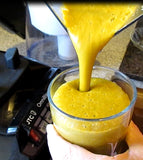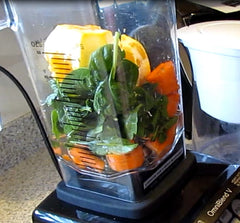Can Smoothies and Supplements Promote Healthy Bones? October 30 2013
 It seems that there are virtually thousands of supplements and ingredients on the market that claim to protect against nearly every imaginable ailment and affliction. To add to this confusion, websites selling supplements are coming online at an incredibly fast rate. If you are looking for the right supplements for bone health, a good place is a basic list of vitamins and minerals, the proper daily dosage based on age, and how you can derive the most benefit from them. ...Or, you could try a concoction of your own... A Calcium Smoothie?
It seems that there are virtually thousands of supplements and ingredients on the market that claim to protect against nearly every imaginable ailment and affliction. To add to this confusion, websites selling supplements are coming online at an incredibly fast rate. If you are looking for the right supplements for bone health, a good place is a basic list of vitamins and minerals, the proper daily dosage based on age, and how you can derive the most benefit from them. ...Or, you could try a concoction of your own... A Calcium Smoothie?
Facts about Bones
Bones are very much like tissue in the body, and they are changing all the time as cells die and are replaced. The aging process does place a premium on the importance of keeping bones strong to prevent osteoporosis and loss of bone mass. While age is related to bone mass in women, healthy bones can be maintained with proper levels of calcium, vitamin D and protein. The amount of physical activity and the exposure to environmental risks such as smoking and alcohol consumption also affect bone health.
During childhood bone mass grows and in adulthood the rate of new growth and the rate of bone mass decline are about equal. After menopause, however, women will begin to experience loss of bone mass. Men who are over 50 years of age also lose bone mass but at a rate that is half that of women.
The Calcium Connection to Vitamin D
If you take calcium supplements, it is necessary to have vitamin D in sufficient quantities for the calcium to be absorbed. A person whose blood test shows a vitamin D deficiency will need to take supplements or make dietary changes to protect the body’s skeletal structure.
One way to assure that you get the daily allowance of calcium and vitamin D is to use fortified dairy milk or almond milk when you make raw smoothies. For example, eight ounces of almond milk provides 45% of the calcium and 25% of the vitamin D required on average in a day. Vitamin D is added to fortified diary milk in the US to help consumers meet the recommended dietary allowance (RDA).
Are There Risks to Calcium Supplements?
According to an article published by the Daily Mail on July 30, 2010, results of a study that appeared on the British Medical Journal’s website suggested that women who take calcium supplements may be at an increased risk of suffering a heart attack. Researchers concluded that the supplements, which were 500mg or greater, contributed to the hardening of arteries. However, the researchers determined that those who consumed a high amount of calcium through diet were not at the same risk. Another caveat to mention is that patients who were baking supplements of both calcium and vitamin D were not included in the study.
What conclusion can be drawn from this study? Women who are postmenopausal should make sure that they get enough vitamin D and calcium through fortified milk, grains and yogurt. Yogurt is a healthy base to use when making raw smoothies in your high performance blender.
Protein and Bone Health
- Better Bones website that older adults who have suffered a hip fracture have better post-surgical outcomes if they have the right amount of protein in their blood system. She notes that they have fewer complications and tend to stay in the hospital for a shorter time. While too little protein can be dangerous, we are more likely in the US to suffer the consequences of too much protein, which can lead to the loss of vital minerals and the undermining of bone health.
There is a complex set of variables in diet that can influence how well an older person recovers from fractures and there is little evidence that protein levels alone make a difference one way or the other. Generally, though, medical experts agree that protein does not build bone. It does help to build muscles and keep tissues and organs healthy.
While calcium and vitamin D supplements can help promote healthy bone mass in people who are more than 50 years old, it is best to discuss concerns with your doctor before starting on a new regimen. Making raw smoothies with ingredients that provide the right amounts of calcium and vitamin D is a good alternative to supplements.
 Calcium Smoothie
Calcium Smoothie
½ cup cilantro
½ cup baby spinach leaves
2 oranges
2 regular size carrots
1 cup of water
Blend for about 30 to 45 seconds in a 3 horsepower blender.
Author Thomas Fox (C) 2013 - for OMNIBLEND
